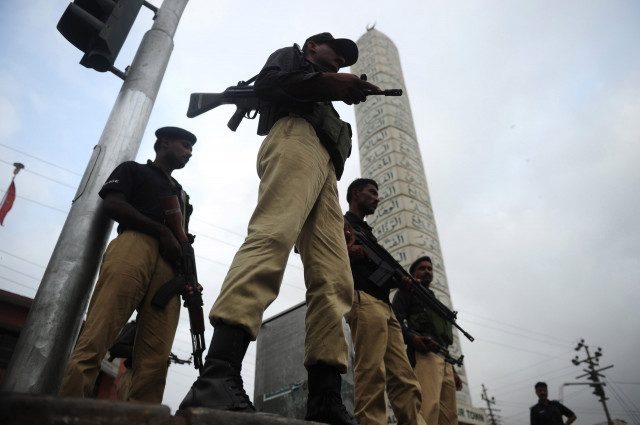Fear factor: No-go areas scare policemen, says DIG West
The apex court held the hearing because of a special report published in The Express Tribune.

Pakistani policemen stand guard in a troubled neighbourhood in Karachi. PHOTO: AFP/ FILE
It seems as if the dominos have begun to fall: a little over a week after DIG South Shahid Hayat cracked and came clean about the existence of no-go areas, DIG West Zafar Abbas Bukhari followed suit, admitting to the Chief Justice of Pakistan that law enforcers fear setting their feet in some of the city’s troubled spots.
The senior police official voiced fear on Friday during an apex court hearing linked to the Karachi violence case. The Supreme Court held the hearing because of a special report on no-go areas published in the March 23 edition of The Express Tribune’s Karachi pages. The report lists 13 spots of the city where law enforcers have a tough time imposing the writ of the state, because gangsters and militants have fortified themselves in the areas. It also lists 29 spots in the city, which become no-go zones for some ethnicities when a wave of ethnic violence sweeps the city.
The apex court’s five-member bench, headed by Chief Justice Iftikhar Muhammad Chaudhry, comprised Justice Jawwad S Khawaja, Justice Khilji Arif Hussain, Justice Amir Hani Muslim and Justice Ejaz Afzal.
Some of the city’s most dangerous spots lie within DIG Bukhari’s jurisdiction, including Pakhtunabad, Sultanabad, Ittehad Town, New Mianwali Colony and Kunwari Colony. Interestingly, it has been about two weeks since DIG Bukhari became responsible for these spots - he had replaced Javed Odho who had been serving at the post since October 2012.

At the hearing, DIG Bukhari told the five-member bench that though law enforcers were trying to watch citizens’ backs, nobody was covering theirs. “The police fear entering the areas that seem to be controlled by criminals as we have lost many men. But we haven’t been able to book those who have killed law enforcers,” he said, adding that 28 policemen had been gunned down since January. He added that law enforcers are getting demoralised as the men who bump off policemen are rarely nabbed and brought to justice.
DIG Bukhari then assured the court that some headway was being made - he said that the police had cut the chord with political groups and since it is no longer tethered, it can chase all criminals. In response to this, Justice Khilji Arif Hussain reminded the DIG that the rule of law should always prevail over that of groups that flex their political muscles.
The police officer further said there were between 150 and 200 men belonging to the Tehreek-e-Taliban Pakistan operating in Karachi. He added that law enforcers constantly find themselves locked in a frustrating game of Whak-a-Mole - when TTP men are detected and chased in one spot of the city, they simply move to another and fortify themselves there.
The bench was not satisfied, however, with DIG Bukhari’s arguments as well as that of the SSP of district Central, Amir Khan. The bench directed the director-general of Rangers in Karachi and Sindh IGP to submit their replies about whether the information presented in The Express Tribune’s special report about no-go areas is factually correct. If the report is indeed correct, then the two agencies must answer why they have failed to wipe out no-go areas and why the DG Rangers kept denying their existence during the hearings of the Karachi violence case, said the bench. It added that if the report is not correct, then the law enforcers must explain why the law and order situation is still deteriorating. The bench also directed the IGP to ask SHOs about the existence of such areas and adjourned the matter till April 4, when the case would be taken up in the apex court’s Karachi registry.
Published in The Express Tribune, March 30th, 2013.



















COMMENTS
Comments are moderated and generally will be posted if they are on-topic and not abusive.
For more information, please see our Comments FAQ